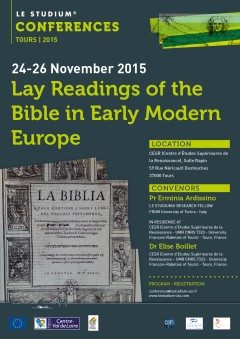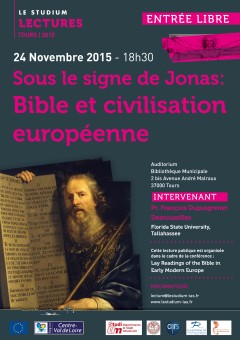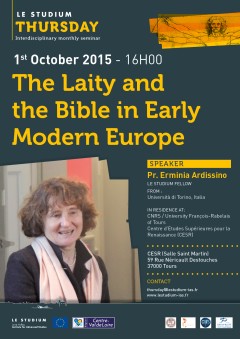Prof. Erminia Ardissino

From
In residence at
Centre for Advanced Studies in the Renaissance (CESR) / CNRS, University of Tours - FR
Host scientist
Dr Elise Boillet
BIOGRAPHY
Erminia Ardissino (Ph.D., Yale University 1993; Dottorato di Ricerca, Università Cattolica del Sacro Cuore, Milano 1995) was associate professor at the University of Turin. She also taught at several American universities. She mainly dealt with literature from Dante to the seventeenth century, with particular attention to the relationship with the history of ideas and religious experience. His books include:“L'aspra tragedia”. Poesia e sacro in Torquato Tasso (1996), Il Barocco e il sacro. La predicazione del teatino Paolo Aresi fra letteratura, immagini e scienza (2001), Tempo storico e tempo liturgico nella Commedia di Dante (2009), Galileo. La scrittura dell’esperienza. Studio sulle lettere (2010), L’umana Commedia di Dante (2016), Donne interpreti della Bibbia nell’Italia della prima età moderna. Riscritture e comunità ermeneutiche (2020); Poesia in forma di preghiera. Svelamenti dell’essere da Francesco d’Assisi ad Alda Merini (2023). She has also published critical editions of ancient texts, commented editions, contributions on the teaching of literature and Italian for foreigners, collections of essays (including with Elisabetta Selmi in 2012 Visibile teologia. Il libro sacro figurato tra Cinque e Seicento, and in 2023 Rivelazioni. Scritture di donne e per donne nell’Italia della prima età moderna; with Elise Boillet en 2019 Gli Italiani e la Bibbia. Leggere, interpretare, riscrivere, and in 2020 Lay Readings of the Bible in Early Modern Europe). At the CESR in Tours he wrote with Elise Boillet the Repertorio di letteratura biblica in italiano (ca 1462-1650) (2023). She has received numerous awards.
PROJECT 2024
Praying in Renaissance: a multiplicity of texts, theories, and practices in a changing Europe
The European Renaissance saw a deep renewal of the form and content of prayer. Even before the Reformation (whether Protestant or Catholic), the growing role played by lay people, women and men, in the religious sphere created new forms of worship, developing new music, new practices, and new texts. The renewal became even more intense during the 16th and 17th centuries, two centuries defined and devastated by changing confessional identities. The project intends to study, from a multidisciplinary perspective, the changes which took place in this everyday practice in the early modern period.
PROJECT 2015
The laity and the bible: Religious reading in early modern Europe
The period between 1470 and 1650 saw dramatic cultural changes: the development of the printing, the literary affirmation of vernacular languages, the spreading of new religious doctrines and the formation of a confessionalised Europe. The traditional image of this period is biased by research paradigms stressing divides and disruptions, such as social and ideological oppositions (laity/clergy, non–Latinate/Latinate, Protestants or heterodox/Catholics) and chronological turning points towards the modern era (before and after Luther, before and after the Council of Trent). Recent research has demonstrated that participation of the laity to biblical literature and culture was wide in the late medieval Europe before the emergence of Protestantism and revealed a world of multiple opportunities characterized by cultural and theological fluidity. It has also challenged the protestant paradigm in early modern Europe, especially in England, the Low Countries and France. The main objective of the research is to investigate the participation of the laity in biblical culture in Europe with a focus on Italy, where the Roman Catholic Church had particular weight, from the beginning of the printing era (long before Luther) to the mid-seventeenth century (long after the reaffirmation of the Catholic dogma on justification). The project thus participates in the current European research on what is a fundamental issue for the formation of modern European identities.
Investigating the vast and still not sufficiently explored field of early modern Italian religious literature, the research will cross the historical, bibliographical and literary methods, in order to test the continuity of the lay participation from the end of the fifteenth century to the middle of the seventeenth century. It will study a large collection of primary sources in connection with a sound study of secondary literature, in order to reconstruct the possibilities and impossibilities of access for the laity to biblical books and the various ways of its participation to biblical culture and literature. It seeks to answer the following questions: Who write for lay readers? What were the religious and cultural purposes of addressing lay readers? What were the forms and contents of biblical books intended for laypeople? What uses of biblical books were recommended or prohibited? Was the lay authorship and readership promoted in a polemical way? What kinds of collaboration, through time, existed between lay and religious authors and readers? Challenging the scholarly view of the participation of the laity in biblical culture, its chronological bounds and its social and ideological context, the research will illustrate the circulation of reading techniques, literary genres and religious knowledge between religious and lay worlds, and show the active participation of lay culture in the formation of the modern religious identities.



